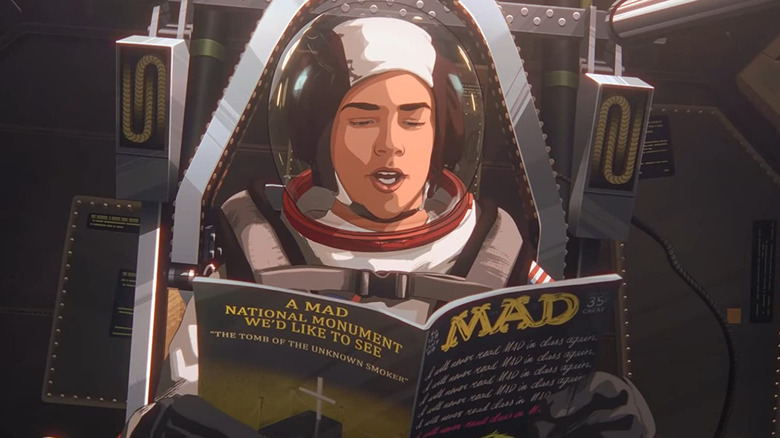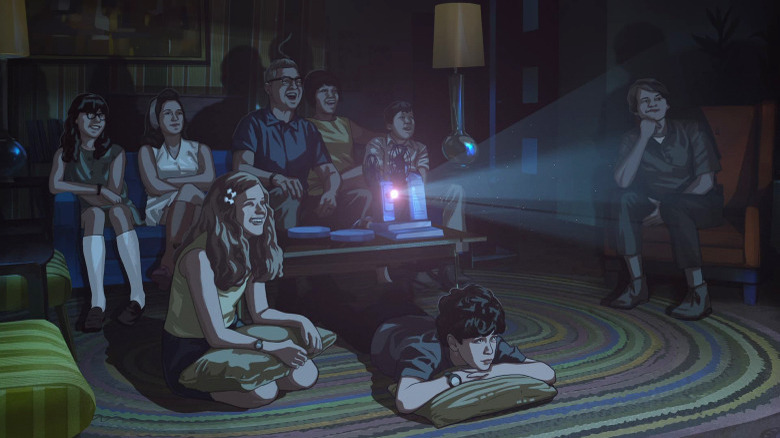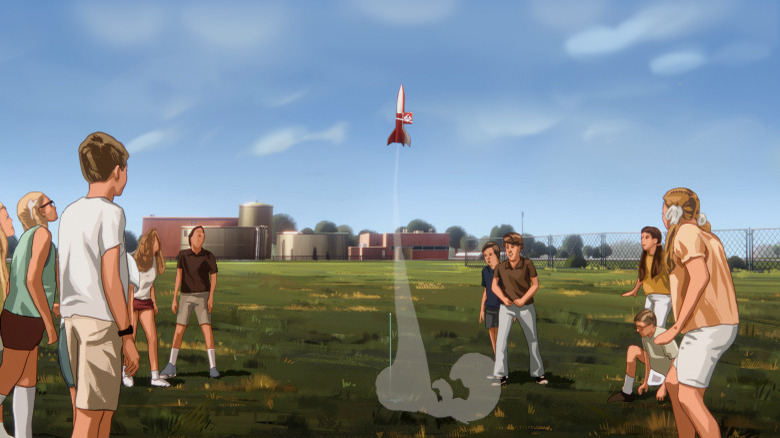The Daily Stream: Apollo 10 1/2 Is Yet Another Reminder That Animation Is Not A Genre
(Welcome to The Daily Stream, an ongoing series in which the /Film team shares what they've been watching, why it's worth checking out, and where you can stream it.)
The Movie: "Apollo 10 1/2: A Space Age Childhood"
Where You Can Stream It: Netflix
The Pitch: Stanley (Milo Coy) is a fourth-grader growing up in Houston in the late 1960s. Like the vast majority of his classmates, he's white, resides in the suburbs, and his father (Bill Wise) is employed by NASA. He's also the youngest child of a large family, which comes with both its benefits (free ice cream cones from his older sister working at Baskin-Robbins) and drawbacks (constant battles with his siblings over which TV shows to watch at night).
One day, a pair of NASA officials named Kranz (Zachary Levi) and Bostick (Glen Powell) show up at Stanley's school, eager to meet with him. As it turns out, the duo want the boy to go to the moon before Apollo 11 does, dubbing the top-secret mission Apollo 10 1/2. Why? Well, as Kranz and Bostick admit with more than a hint of embarrassment, their initial space capsule design proved too small for adult astronauts (math is tough, even when you're a NASA engineer), and they need someone his size to test it out. Plus, Stanley has done some excellent science projects in the past and earned the Presidential Fitness Challenge certificate three years in a row, so he's unquestionably the most-qualified individual for the job.
Why it's essential viewing
Narrated by Jack Black as the grown-up Stanley, "Apollo 10 1/2: A Space Age Childhood" is the latest idiosyncratic movie from "School of Rock," the "Before" trilogy, and "Boyhood" director Richard Linklater. Yes, for those who missed it in this era of Too Much Streaming Content™, a new Linklater film (which he also wrote) only just casually dropped on Netflix.
I'll be honest: "Apollo 10 1/2" isn't Linklater's best work. It's a little clumsy in the way it strings together events both real and imagined by Stanley (no, he doesn't really go to the moon... Or does he? No, he doesn't.), even going off on a patience-testing, nearly 40-minute detour where the adult Stanley waxes nostalgic about life in the '60s. At the same time, it's an often charming and deeply personal film that's clearly drawing heavily from the Houston-born Linklater's own upbringing. It's not a completely rose-tinted vision of the past, either, as Stanley pauses (too briefly, in some cases) to address the troubled side of the time period — be it a war across the pond, racism against the Black community, or the U.S. government's questionable spending practices. Thank goodness we don't have to deal with issues like that anymore, right? (*Nervous laugh*)
If anything, Linklater's attention to the minutiae of Stanley's childhood is the movie's saving grace and, much like Pixar's "Turning Red," brings to mind Roger Ebert's famous quote from his "Brokeback Mountain" review:
"Strange but true: The more specific a film is, the more universal, because the more it understands individual characters, the more it applies to everyone."
Repeat after me: animation is a storytelling tool
This is where Linklater's use of rotoscope-style animation comes into play. The filmmaker's previous rotoscoped features, "Waking Life" and "A Scanner Darkly," utilize this technique to similar yet different effect, highlighting the surreality of their world(s) and/or casting doubt on the reliability of their protagonists. "Apollo 10 1/2: A Space Age Childhood" likewise employs simple 2D animated visuals to call attention to the fact that everything it's showing you is a memory from adult Stanley's POV. As such, select elements stand out far more than others, and the movie is deliberately vague and hazy in its recreation of key places and events. More to the point, the line between what really happened and what Stanley imagines (or would like to imagine) happened grows ever blurrier, although it never vanishes completely.
My apologies to those reading this who attended film school and feel like I'm just making them sit through Animation & Filmmaking 101 again. (I also freely admit to carrying on and on about related topics in the past, old-man-yelling-at-cloud-style.) But, then again, considering that the Academy of Motion Pictures Arts and Sciences only just put on an Oscar show that dismissed animated movies as being glorified, shiny toys meant to distract little kids for a couple of hours, it's worth reiterating: Animation is a storytelling tool that can encompass all manner of stories, tones, and subject matter, and is not a genre unto itself.


